Module3 Sports unit2课件2023-2024学年外研版英语八年级上册(34张PPT)
文档属性
| 名称 | Module3 Sports unit2课件2023-2024学年外研版英语八年级上册(34张PPT) |
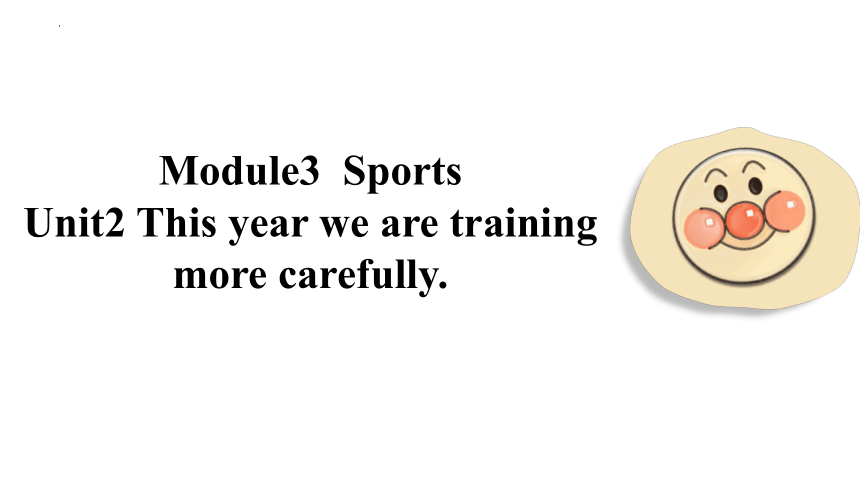
|
|
| 格式 | pptx | ||
| 文件大小 | 2.1MB | ||
| 资源类型 | 教案 | ||
| 版本资源 | 外研版 | ||
| 科目 | 英语 | ||
| 更新时间 | 2023-09-04 00:00:00 | ||
图片预览

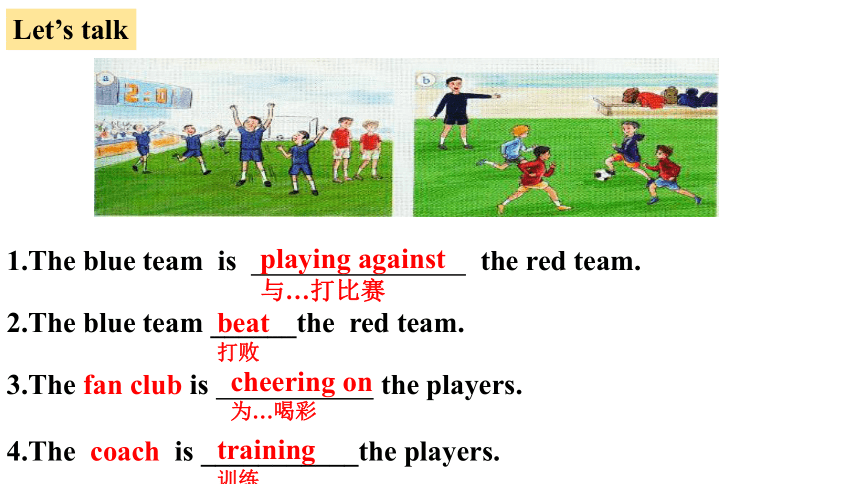
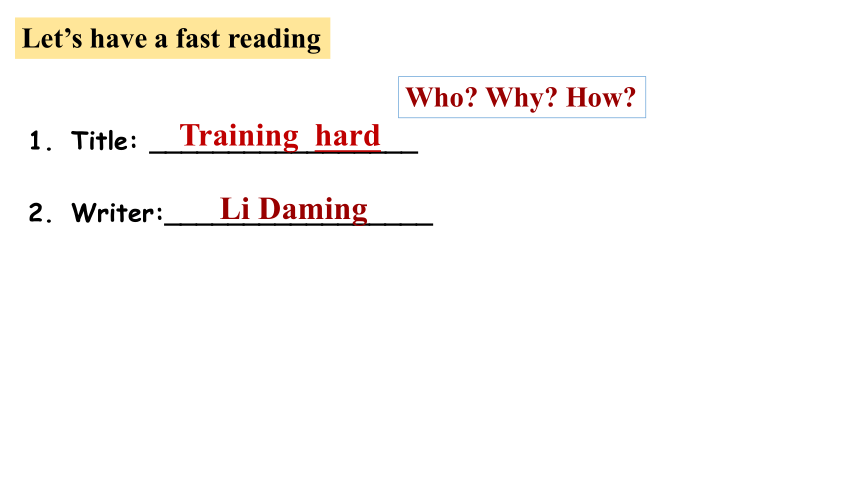
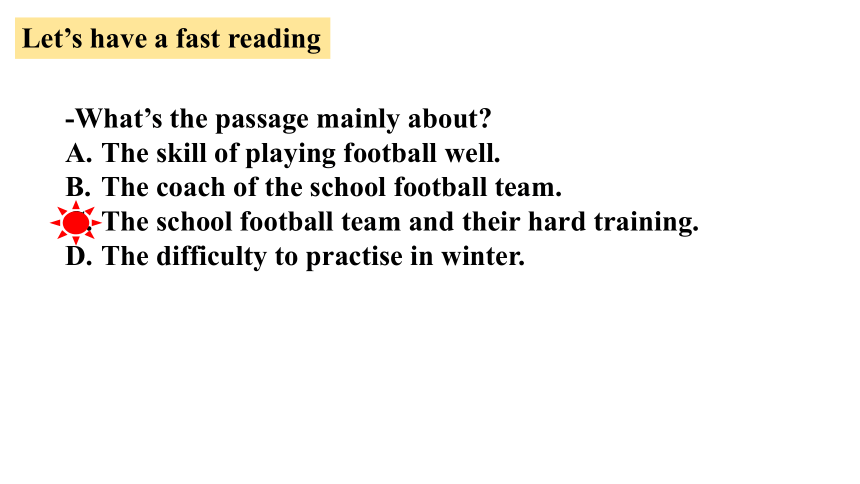
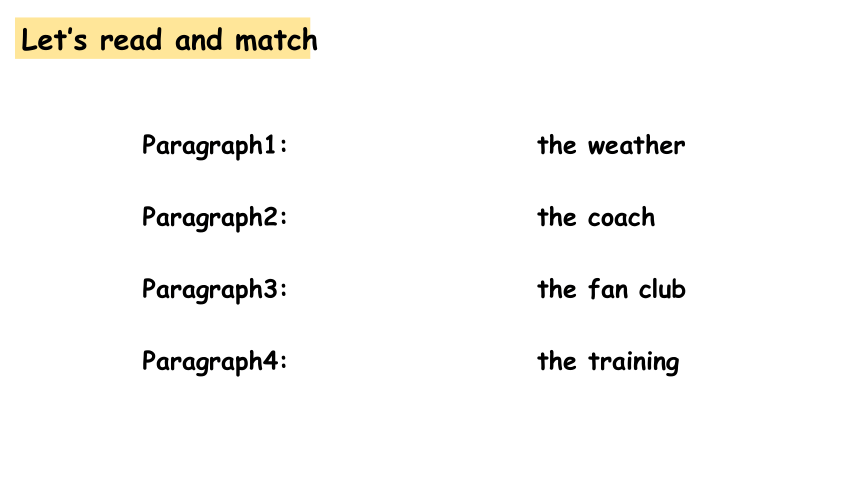
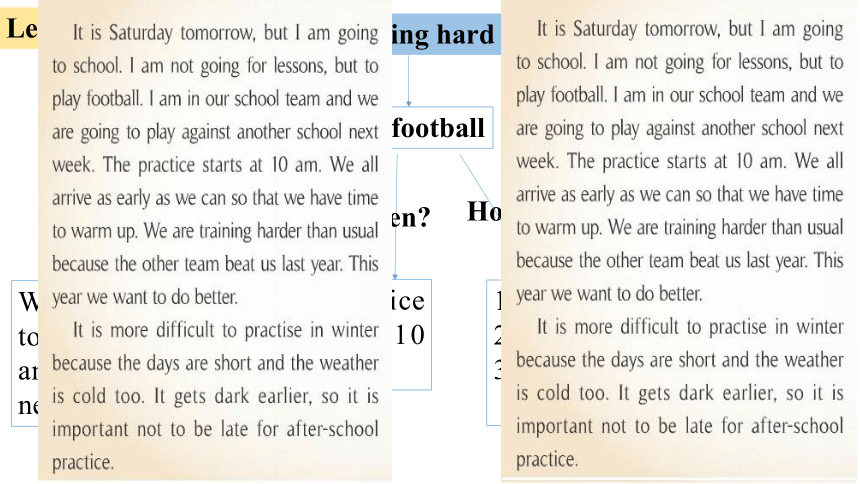
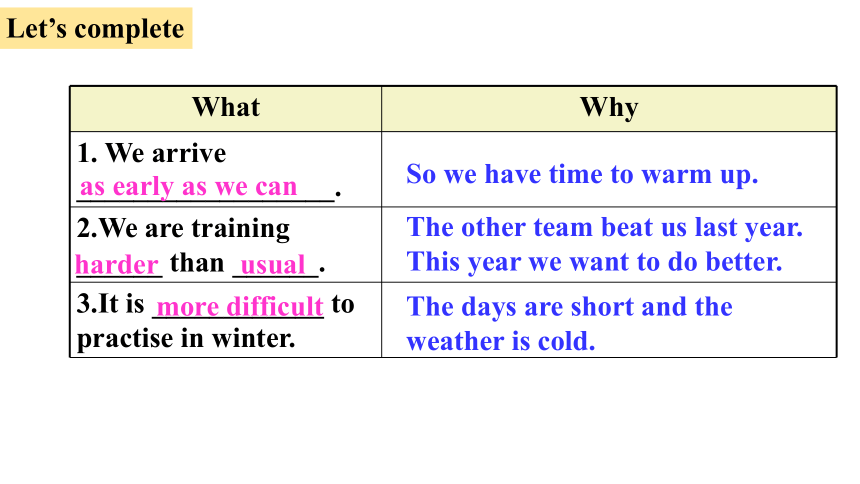
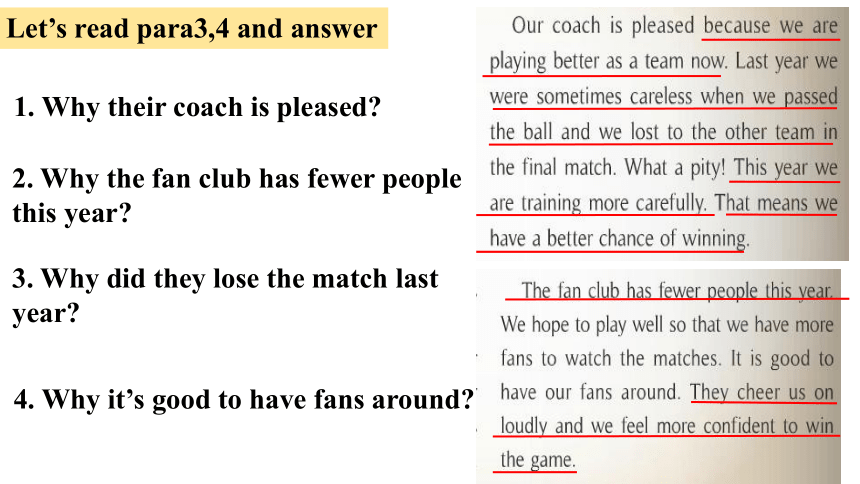

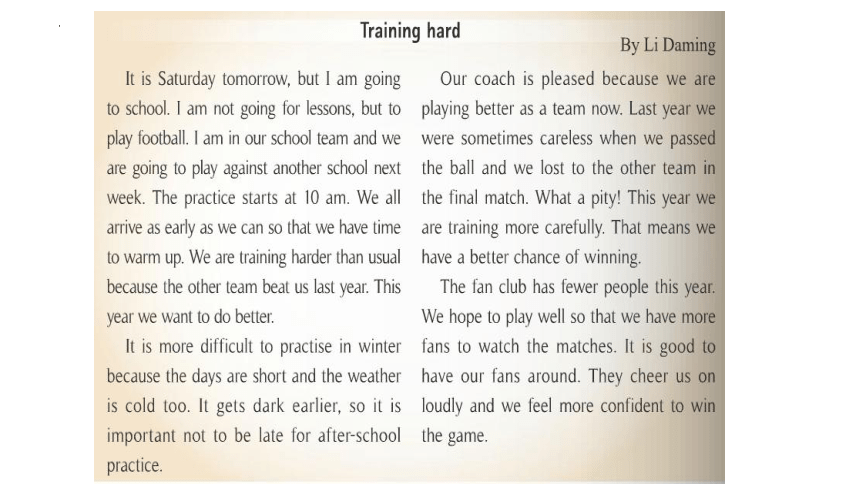
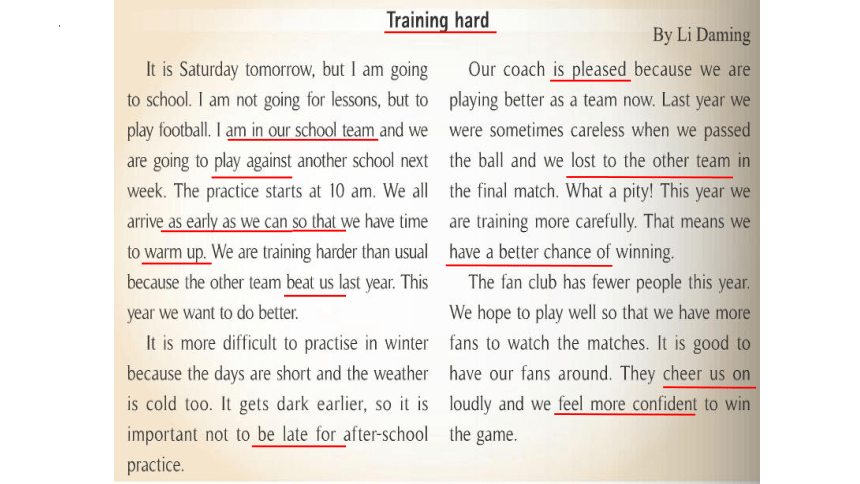
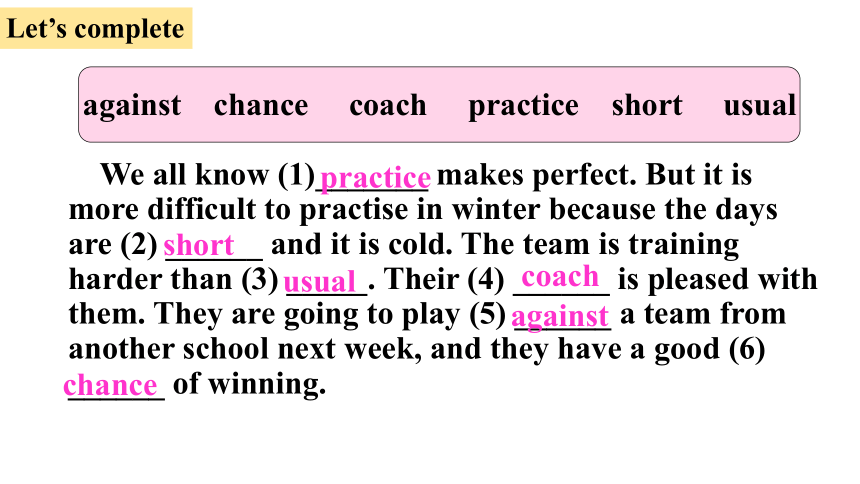
文档简介
(共34张PPT)
Module3 Sports
Unit2 This year we are training more carefully.
Let’s talk
1.The blue team is the red team.
2.The blue team ______the red team.
3.The fan club is the players.
4.The coach is ___________the players.
playing against
与…打比赛
beat
打败
cheering on
为…喝彩
training
训练
Let’s have a fast reading
Title: _________________
Writer:_________________
Training hard
Li Daming
Who Why How
Let’s have a fast reading
-What’s the passage mainly about
The skill of playing football well.
The coach of the school football team.
The school football team and their hard training.
The difficulty to practise in winter.
Paragraph1:
Paragraph2:
Paragraph3:
Paragraph4:
Let’s read and match
the weather
the coach
the fan club
the training
training hard
play football
We are going to play against another school next week.
Why
When
The practice starts at 10 am.
How
arrive as early as we can
train harder than usual
Not to be late for after-school practice.
Let’s read para1 and 2
What Why
1. We arrive __________________.
2.We are training ______ than ______.
3.It is ____________ to practise in winter.
as early as we can
harder
usual
more difficult
So we have time to warm up.
The other team beat us last year. This year we want to do better.
The days are short and the weather is cold.
Let’s complete
Let’s read para3,4 and answer
1. Why their coach is pleased
2. Why the fan club has fewer people this year
4. Why it’s good to have fans around
3. Why did they lose the match last year
lost
win
play football on __________
arrive __________ we can
train _______ than usual
not to be late for ____________ practice
train ______ carefully
play better and have a _______ ______ of winning
hope to have __________ cheer us on
feel ______
__________to win
Training hard
Saturday
as early as
harder
after-school
more
better
chance
more fans
more confident
Let’s retell
against chance coach practice short usual
We all know (1)_______ makes perfect. But it is more difficult to practise in winter because the days are (2) ______ and it is cold. The team is training harder than (3) _____. Their (4) ______ is pleased with them. They are going to play (5) ______ a team from another school next week, and they have a good (6) ______ of winning.
practice
short
usual
coach
against
chance
Let’s complete
副词(Adverb)是指在句子中表示行为或状态特征的词,初中阶段学会修饰动词的副词即可。
找一找刚才圈出的副词修饰的是哪些动词。
形容词:1.修饰名词,放在名词前
eg: This is a tall tree.
It is an interesting film.
2.放在be动词,系动词后,对某物或某人进行描述.
eg: Cycling is tiring.
She looks beautiful.
副词: 描述实义动词,一般位于动词后
eg: The boy runs fast.
Look! The students are talking loudly.
形容词和副词的用法
1.形容词+ly=副词
slow-slowly loud-loudly clear-clearly bad- badly
2.去y 变i+ ly
easy- easily heavy- heavily
happy-happily healthy-healthily
3.不变
early(早的/地) late (晚的/地)
fast (快的/地) hard (困难的,辛苦的,努力地)
4.特殊
good—well
形容词变副词
1.I will catch (赶)the _____ bus , so I’ll get up _____(early).
2.This question is _______ , so I can answer it ______(easy).
3. Betty is ______ at playing the piano and she can play it ________.(good)
4. My English is ______ and I speak ________(bad).
5.Old people walk _______(slow) .
6. Look! They are talking _______and they are having a _______time. (happy)
7.I don’t want to go to school _______(late).
8.This is a _______job , but we are working ______.(hard)
early
early
easy
easily
good
well
bad
badly
slowly
happily
happy
late
hard
hard
用形容词或副词填空
I am not going for lessons, but to play football.
not…but… 意为“不是…而是…”,连接两个并列成分做主语时,谓语要遵循“就近原则 ”。如:
Tom is not a teacher, but a student.
I am in our school team ...
in/on our/the school team意为“在校队中”或“是校队的队员”。如:
Tom is in/on our school football team.
...and we are going to play against another school next week.
play against…是固定短语,意为“与……比赛/对抗”。against 是介词,意为“与……对抗,(在比赛/战斗中)对(某人/物)”。它常与play, fight,speak, act, vote, struggle, argue等动词连用。如:
They were fighting against the enemy.
Germany are playing against Brazil in the WorldCup final tonight.
【拓展】against还可以表示“反对 (反义词为for);撞击;紧靠;防备”等含义。如:
hit against a tree 撞到树上;against thewall 靠在墙上;save money against the old age存钱养老。
We are against/for the suggestion.
He stood against the tree.
...and we are going to play against another school next week.
【辨析】another,other,theother,others 和the others的区别:
①another既可作形容词,也可作代词,只能用于三个或更多的人或物,泛指同类事物中的三者或三者以上的“另一个”,只能代替或修饰单数可数名词。如:
You can see another ship in the sea, can’t you (形容词)
I don’t like thisone. Please show me another. (代词)
②other是形容词,意为“别的,其他的”,泛指“其他的(人或物)”,只能与复数名词连用。但other前有冠词the即可与单数名词连用。但anyother后要跟单数名词。如:
She doesn’t like other skirts.
He is taller than any other student in his class.
③the other:指“特指两个人或物中的一个”,此时的other作代词,常构成短语one…theother…。此外,the other后可接单数名词,也可接复数名词,此时的other作形容词。如:
Mary is much taller than the other girls.
He has two brothers. One is 10 years old , the other is 5 years old.
④others是名词,相当于“other+复数名词”,泛指“另外几个,其余的”。在句中可作主语、宾语。常构成短语some…others…。如:
Some went to the cinema, others went swimming.
This coat is too large. Show me some others, please.
⑤the others是名词,相当于“the other+复数名词”,表示特指某范围内的“其他的人或物”。如:
Two boys will go to the zoo, and the others will stay at home.
The practice starts at 10 am.
practice n. 练习
它的动词是practise,practise后接名词或动名词形式作宾语,而不用动词不定式作宾语,即practise (doing) sth.,意为“练习(做)某事”。如:
We need conversationpractice every day.
The young man practisedspeaking English with Mr. Green.
We all arrive as early as we can so that we have time to warm up.
【辨析】arrive,getto和reach的区别:
①arrive是不及物动词,表示“到达、抵达某地(尤指行程的终点),后常接介词at或in,一般in接大地方,at接小地方,若是地点副词,则不需用介词。如:
We arrived in Beijing yesterday.
They arrived at the station at 8 this morning.
Her mother saw her when she arrived home.
We all arrive as early as we can so that we have time to warm up.
②reach是及物动词,直接接宾语,无须介词,和arrive一样,属正式用语。如:
They reached Beijing on February 17.
He had left when I reached the station.
③和arrive一样,get也是不及物动词,只是它多用于口语,其后接的介词是to,后面如接副词,则不用介词to。如:
Have we got to the zoo yet
We all arrive as early as we can so that we have time to warm up.
【辨析】so that和so…that… 的区别
①so that可引导目的状语从句,意为“以便;为了;目的是”,此时so that后面从句中的谓语动词常和can, could, may, might, should等情态动词连用。如:
He get up very early so that he cancatch the train.
【拓展】so that也可引导结果状语从句,意为“因此;所以”,在口语中that可以省略。如:
He raised his voice, so that everyone heard him.
②so … that …“如此……以至于……”,引导结果状语从句,so后面接形容词或副词的原级。如:
We trained so hard that we won the game.
We all arrive as early as we can so that we have time to warm up.
have time to do sth. 意为“有时间做某事”。如:
I don’t have time to practice English.
warm up意为“热身,做准备活动”。warm作动词,意为“使暖和;使暖”。如:
The runners are warming up before the race.
【拓展】warm作形容词时,意为“暖和的,温暖的”,其反义词是cool。
We are training harder than usual because the other team beat us last year.
【辨析】beat和win的区别
①beat意为“打败;战胜”,其宾语是比赛、竞争的对手,即指人或团队的名词或代词。过去式是beat。如:
Our school beat them inthe football match.
We beat the strongest team in the football match this time.
②win 意为“赢得;获胜”,其宾语一般是比赛、战争、奖品、金钱等的名词,即race, match, game,competition, war, prize之类的词。如:America won the war against Iraq.
The little boy won second prize in the drawing competition.
Last year we were sometimes careless ...
【辨析】sometimes,sometime,sometimes和some time的区别
sometimes意为“有时候”,是副词。
sometime指“过去或将来不确定的某个时间”。
some times意为“几次,几倍”。
some time意为“一段时间”。
口诀:分开是“一段”,相连为“某时”。分开s是“倍、次”,相连s是“有时”。如:
I’ll stay here for some
Our school is some times larger than theirs.
Kate will be back sometime in February.
Lucy goes to school on foot, but sometimes by bike.
have a chance of doing sth.=have a chance to do sth.=have an opportunity to do sth. 意为“有做某事的机会”。chance是可数名词,意为“机会;可能性”。如:
I have a chance to go to Beijing.=I have a chance of going to Beijing.
You will have a better chance of passing the exams if you work harder.
If we hurry up,there’s still a good chance of catching the plane.
【拓展】与chance搭配的常用短语:by chance=by accident偶然地,意外地
take a chance to do sth. 冒险去做某事
have no chance to do sth. 没有机会做某事
give sb. a chance给某人一个机会
That means we have a better chance of winning.
Our coach is pleased...
【辨析】pleased和pleasant的区别
⑴pleased是一个形容词,意为“开心的;满足的”相当于happy或glad,常作表语,主语为人,表示是某人高兴、愉快的情感或情绪。常用的四种结构:
①be pleased with意为“对……满意”。如:Our teacher waspleased with us.
②be pleased at/about意为“对……感到高兴”。如:We’re pleased at the chance of going abroad
③be pleased to do sth.意为“乐意/高兴做某事”。如:I’m pleased to meet you again.
④be pleased + that 从句,意为“很高兴……”。如:I’m very pleased that you can come.
⑵pleasant是形容词,只能修饰事物,不能修饰人。作定语时,意为“令人愉快的,令人高兴的”;作表语时,意为“使人感到高兴的/愉快的”。如:I wish you a pleasant trip.
【拓展】please是动词,意为“请,使满意”;please sb意为“取悦某人;使某人高兴”;pleasure是名词,意为“快乐;高兴;娱乐;令人高兴的事”。“It’s apleasure.”和“My pleasure.”常用来回答道谢。“With pleasure.”表示客气地接受或同意,意为“愿意,当然”。如:--Thanks very much!
-- It’s a pleasure./My pleasure.
1. is not easy for them to finish the work in three hours.
A. That B. It C. This D. One
2.No. 15 Middle School No.20 Middle School in the basketball match yesterday.
A. lost B. won C. passed D. beat
3.He was __________ tired__________he could not go on walking.
A. too; to B. such; that C. so; that D. hardly; that
4.--I'll have an important meeting this weekend, so I can't go fishing with you.
--____. I thought we could have a nice time together.
A. It's a pleasure B. You're welcome C. What a pity D.I am sure
5.--Sarah is chosen as the guide for the Fashion Show.
--Great! No one speaks English her.
A.as beautiful as B.as badly as C. worse than D. better than
It was difficult ① ( find ) jobs in the northeast of England,and when John lost ②
(he) job, he found it impossible (不可能的)to get a new one. So he decided ③ (go) clown to the south of the country, where he had heard that it was ④ (easy) to find a job. He went to the station and got ⑤ a train that was going to London. He was the only person in the carriage (车厢) when another man carrying a gun ⑥ (rush) in and said, “Your money, or your life ” ” I haven’t got ⑦ (some) money,” John answered, full offear (恐惧). “Then ⑧w are you trembling (发抖)so much ” the man with the gun asked him ⑨ (angry). “Because I thought you ⑩ ( be ) the ticket collector, and I haven’t even got a ticket.” answered John.
用所给词的适当形式或根据句意填空
to find
his
to go
easy
on
rushed
any
hy
angrily
were
Module3 Sports
Unit2 This year we are training more carefully.
Let’s talk
1.The blue team is the red team.
2.The blue team ______the red team.
3.The fan club is the players.
4.The coach is ___________the players.
playing against
与…打比赛
beat
打败
cheering on
为…喝彩
training
训练
Let’s have a fast reading
Title: _________________
Writer:_________________
Training hard
Li Daming
Who Why How
Let’s have a fast reading
-What’s the passage mainly about
The skill of playing football well.
The coach of the school football team.
The school football team and their hard training.
The difficulty to practise in winter.
Paragraph1:
Paragraph2:
Paragraph3:
Paragraph4:
Let’s read and match
the weather
the coach
the fan club
the training
training hard
play football
We are going to play against another school next week.
Why
When
The practice starts at 10 am.
How
arrive as early as we can
train harder than usual
Not to be late for after-school practice.
Let’s read para1 and 2
What Why
1. We arrive __________________.
2.We are training ______ than ______.
3.It is ____________ to practise in winter.
as early as we can
harder
usual
more difficult
So we have time to warm up.
The other team beat us last year. This year we want to do better.
The days are short and the weather is cold.
Let’s complete
Let’s read para3,4 and answer
1. Why their coach is pleased
2. Why the fan club has fewer people this year
4. Why it’s good to have fans around
3. Why did they lose the match last year
lost
win
play football on __________
arrive __________ we can
train _______ than usual
not to be late for ____________ practice
train ______ carefully
play better and have a _______ ______ of winning
hope to have __________ cheer us on
feel ______
__________to win
Training hard
Saturday
as early as
harder
after-school
more
better
chance
more fans
more confident
Let’s retell
against chance coach practice short usual
We all know (1)_______ makes perfect. But it is more difficult to practise in winter because the days are (2) ______ and it is cold. The team is training harder than (3) _____. Their (4) ______ is pleased with them. They are going to play (5) ______ a team from another school next week, and they have a good (6) ______ of winning.
practice
short
usual
coach
against
chance
Let’s complete
副词(Adverb)是指在句子中表示行为或状态特征的词,初中阶段学会修饰动词的副词即可。
找一找刚才圈出的副词修饰的是哪些动词。
形容词:1.修饰名词,放在名词前
eg: This is a tall tree.
It is an interesting film.
2.放在be动词,系动词后,对某物或某人进行描述.
eg: Cycling is tiring.
She looks beautiful.
副词: 描述实义动词,一般位于动词后
eg: The boy runs fast.
Look! The students are talking loudly.
形容词和副词的用法
1.形容词+ly=副词
slow-slowly loud-loudly clear-clearly bad- badly
2.去y 变i+ ly
easy- easily heavy- heavily
happy-happily healthy-healthily
3.不变
early(早的/地) late (晚的/地)
fast (快的/地) hard (困难的,辛苦的,努力地)
4.特殊
good—well
形容词变副词
1.I will catch (赶)the _____ bus , so I’ll get up _____(early).
2.This question is _______ , so I can answer it ______(easy).
3. Betty is ______ at playing the piano and she can play it ________.(good)
4. My English is ______ and I speak ________(bad).
5.Old people walk _______(slow) .
6. Look! They are talking _______and they are having a _______time. (happy)
7.I don’t want to go to school _______(late).
8.This is a _______job , but we are working ______.(hard)
early
early
easy
easily
good
well
bad
badly
slowly
happily
happy
late
hard
hard
用形容词或副词填空
I am not going for lessons, but to play football.
not…but… 意为“不是…而是…”,连接两个并列成分做主语时,谓语要遵循“就近原则 ”。如:
Tom is not a teacher, but a student.
I am in our school team ...
in/on our/the school team意为“在校队中”或“是校队的队员”。如:
Tom is in/on our school football team.
...and we are going to play against another school next week.
play against…是固定短语,意为“与……比赛/对抗”。against 是介词,意为“与……对抗,(在比赛/战斗中)对(某人/物)”。它常与play, fight,speak, act, vote, struggle, argue等动词连用。如:
They were fighting against the enemy.
Germany are playing against Brazil in the WorldCup final tonight.
【拓展】against还可以表示“反对 (反义词为for);撞击;紧靠;防备”等含义。如:
hit against a tree 撞到树上;against thewall 靠在墙上;save money against the old age存钱养老。
We are against/for the suggestion.
He stood against the tree.
...and we are going to play against another school next week.
【辨析】another,other,theother,others 和the others的区别:
①another既可作形容词,也可作代词,只能用于三个或更多的人或物,泛指同类事物中的三者或三者以上的“另一个”,只能代替或修饰单数可数名词。如:
You can see another ship in the sea, can’t you (形容词)
I don’t like thisone. Please show me another. (代词)
②other是形容词,意为“别的,其他的”,泛指“其他的(人或物)”,只能与复数名词连用。但other前有冠词the即可与单数名词连用。但anyother后要跟单数名词。如:
She doesn’t like other skirts.
He is taller than any other student in his class.
③the other:指“特指两个人或物中的一个”,此时的other作代词,常构成短语one…theother…。此外,the other后可接单数名词,也可接复数名词,此时的other作形容词。如:
Mary is much taller than the other girls.
He has two brothers. One is 10 years old , the other is 5 years old.
④others是名词,相当于“other+复数名词”,泛指“另外几个,其余的”。在句中可作主语、宾语。常构成短语some…others…。如:
Some went to the cinema, others went swimming.
This coat is too large. Show me some others, please.
⑤the others是名词,相当于“the other+复数名词”,表示特指某范围内的“其他的人或物”。如:
Two boys will go to the zoo, and the others will stay at home.
The practice starts at 10 am.
practice n. 练习
它的动词是practise,practise后接名词或动名词形式作宾语,而不用动词不定式作宾语,即practise (doing) sth.,意为“练习(做)某事”。如:
We need conversationpractice every day.
The young man practisedspeaking English with Mr. Green.
We all arrive as early as we can so that we have time to warm up.
【辨析】arrive,getto和reach的区别:
①arrive是不及物动词,表示“到达、抵达某地(尤指行程的终点),后常接介词at或in,一般in接大地方,at接小地方,若是地点副词,则不需用介词。如:
We arrived in Beijing yesterday.
They arrived at the station at 8 this morning.
Her mother saw her when she arrived home.
We all arrive as early as we can so that we have time to warm up.
②reach是及物动词,直接接宾语,无须介词,和arrive一样,属正式用语。如:
They reached Beijing on February 17.
He had left when I reached the station.
③和arrive一样,get也是不及物动词,只是它多用于口语,其后接的介词是to,后面如接副词,则不用介词to。如:
Have we got to the zoo yet
We all arrive as early as we can so that we have time to warm up.
【辨析】so that和so…that… 的区别
①so that可引导目的状语从句,意为“以便;为了;目的是”,此时so that后面从句中的谓语动词常和can, could, may, might, should等情态动词连用。如:
He get up very early so that he cancatch the train.
【拓展】so that也可引导结果状语从句,意为“因此;所以”,在口语中that可以省略。如:
He raised his voice, so that everyone heard him.
②so … that …“如此……以至于……”,引导结果状语从句,so后面接形容词或副词的原级。如:
We trained so hard that we won the game.
We all arrive as early as we can so that we have time to warm up.
have time to do sth. 意为“有时间做某事”。如:
I don’t have time to practice English.
warm up意为“热身,做准备活动”。warm作动词,意为“使暖和;使暖”。如:
The runners are warming up before the race.
【拓展】warm作形容词时,意为“暖和的,温暖的”,其反义词是cool。
We are training harder than usual because the other team beat us last year.
【辨析】beat和win的区别
①beat意为“打败;战胜”,其宾语是比赛、竞争的对手,即指人或团队的名词或代词。过去式是beat。如:
Our school beat them inthe football match.
We beat the strongest team in the football match this time.
②win 意为“赢得;获胜”,其宾语一般是比赛、战争、奖品、金钱等的名词,即race, match, game,competition, war, prize之类的词。如:America won the war against Iraq.
The little boy won second prize in the drawing competition.
Last year we were sometimes careless ...
【辨析】sometimes,sometime,sometimes和some time的区别
sometimes意为“有时候”,是副词。
sometime指“过去或将来不确定的某个时间”。
some times意为“几次,几倍”。
some time意为“一段时间”。
口诀:分开是“一段”,相连为“某时”。分开s是“倍、次”,相连s是“有时”。如:
I’ll stay here for some
Our school is some times larger than theirs.
Kate will be back sometime in February.
Lucy goes to school on foot, but sometimes by bike.
have a chance of doing sth.=have a chance to do sth.=have an opportunity to do sth. 意为“有做某事的机会”。chance是可数名词,意为“机会;可能性”。如:
I have a chance to go to Beijing.=I have a chance of going to Beijing.
You will have a better chance of passing the exams if you work harder.
If we hurry up,there’s still a good chance of catching the plane.
【拓展】与chance搭配的常用短语:by chance=by accident偶然地,意外地
take a chance to do sth. 冒险去做某事
have no chance to do sth. 没有机会做某事
give sb. a chance给某人一个机会
That means we have a better chance of winning.
Our coach is pleased...
【辨析】pleased和pleasant的区别
⑴pleased是一个形容词,意为“开心的;满足的”相当于happy或glad,常作表语,主语为人,表示是某人高兴、愉快的情感或情绪。常用的四种结构:
①be pleased with意为“对……满意”。如:Our teacher waspleased with us.
②be pleased at/about意为“对……感到高兴”。如:We’re pleased at the chance of going abroad
③be pleased to do sth.意为“乐意/高兴做某事”。如:I’m pleased to meet you again.
④be pleased + that 从句,意为“很高兴……”。如:I’m very pleased that you can come.
⑵pleasant是形容词,只能修饰事物,不能修饰人。作定语时,意为“令人愉快的,令人高兴的”;作表语时,意为“使人感到高兴的/愉快的”。如:I wish you a pleasant trip.
【拓展】please是动词,意为“请,使满意”;please sb意为“取悦某人;使某人高兴”;pleasure是名词,意为“快乐;高兴;娱乐;令人高兴的事”。“It’s apleasure.”和“My pleasure.”常用来回答道谢。“With pleasure.”表示客气地接受或同意,意为“愿意,当然”。如:--Thanks very much!
-- It’s a pleasure./My pleasure.
1. is not easy for them to finish the work in three hours.
A. That B. It C. This D. One
2.No. 15 Middle School No.20 Middle School in the basketball match yesterday.
A. lost B. won C. passed D. beat
3.He was __________ tired__________he could not go on walking.
A. too; to B. such; that C. so; that D. hardly; that
4.--I'll have an important meeting this weekend, so I can't go fishing with you.
--____. I thought we could have a nice time together.
A. It's a pleasure B. You're welcome C. What a pity D.I am sure
5.--Sarah is chosen as the guide for the Fashion Show.
--Great! No one speaks English her.
A.as beautiful as B.as badly as C. worse than D. better than
It was difficult ① ( find ) jobs in the northeast of England,and when John lost ②
(he) job, he found it impossible (不可能的)to get a new one. So he decided ③ (go) clown to the south of the country, where he had heard that it was ④ (easy) to find a job. He went to the station and got ⑤ a train that was going to London. He was the only person in the carriage (车厢) when another man carrying a gun ⑥ (rush) in and said, “Your money, or your life ” ” I haven’t got ⑦ (some) money,” John answered, full offear (恐惧). “Then ⑧w are you trembling (发抖)so much ” the man with the gun asked him ⑨ (angry). “Because I thought you ⑩ ( be ) the ticket collector, and I haven’t even got a ticket.” answered John.
用所给词的适当形式或根据句意填空
to find
his
to go
easy
on
rushed
any
hy
angrily
were
同课章节目录
- Module 1 How to learn English
- Unit 1 Let's try to speak English as much as possi
- Unit 2 You should smile at her.
- Unit 3 Language in use .
- Module 2 My home town and my country
- Unit 1 It's taller than many other buildings.
- Unit 2 Cambridge is a beautiful city in the east o
- Unit 3 Language in use .
- Module 3 Sports.
- Unit 1 Nothing is more exciting than playing tenni
- Unit 2 This year we training more carefully.
- Unit 3 Language in use .
- Module 4 Planes, ships and trains .
- Unit 1 He lives the farthest from school.
- Unit 2 What is the best way to travel.
- Unit 3 Language in use .
- Module 5 Lao She Teahouse.
- Unit 1 I wanted to see the Beijing Opera.
- Unit 2 It descibes the changes in Chinese society.
- Unit 3 Language in use .
- Module 6 Animals in danger.
- Unit 1 It allows people to get closer to them .
- Unit 2 The WWF is working hard to save them all.
- Unit 3 Language in use .
- Revision module A
- Module 7 A famous story
- Unit 1 Alice was sitting with her sister by the ri
- Unit 2 She was thinking about her cat.
- Unit 3 Language in use .
- Module 8 Accidents
- Unit 1 While the car were changing to red, a car s
- Unit 2 I was trying to pick it up when it bite me
- Unit 3 Language in use .
- Module 9 Population
- Unit 1 The population of China is about 1.37 billi
- Unit 2 Arnwick was a city with 200,000 people.
- Unit 3 Language in use .
- Module 10 The weathe
- Unit 1 It might snow.
- Unit 2 The weather is fine all year round.
- Unit 3 Language in use .
- Module 11 Way of life
- Unit 1 In China ,we open a gift later.
- Unit 2 In England, you usually drink tea with milk
- Unit 3 Language in use .
- Module 12 Help
- Unit 1 What should we do before help arrives?
- Unit 2 Stay away from windows and heavy furniture.
- Unit 3 Language in use .
- Revision module B
